Unlock the Editor’s Digest for free
Roula Khalaf, Editor of the FT, selects her favourite stories in this weekly newsletter.
Eight years ago, Steven Borrelli, a West Coast American entrepreneur raised, $50,000 from family and friends to start an e-commerce clothing group called Cuts. He has since grown it into a successful venture using just internal funds.
Now, however, he needs a financial lifeline. The reason? Like many others, Borrelli imports goods from countries including China and Vietnam. He now faces the expiration today of the crucial “de-minimis” regime that has previously spared lower-price Chinese imports from tariffs, in addition to the fallout from wider tariff increases.
And even if he can partly offload that on to suppliers and customers, Borrelli somehow has to find money to pay the tariff bill, let alone make the investments needed to move his supply chain. Even banks seem to be shying away because of the economic uncertainty and stigma around China; or so he tells me. “I support Trump’s vision,” he stresses, noting he has repeatedly voted for him. “But we need time to adjust [or] you will see hundreds of thousands of companies going bust.”
Investors — and Trump himself — should pay attention. Following this week’s news that the economy contracted by 0.3 per cent in the first quarter, there has been an explosion of angst about the disruptive impact of tariffs on the physical movement and price of goods. And as retailers are already starting to prepare for Christmas, Trump is beginning to look like the Grinch. Indeed, he seemed to acknowledge that himself this week, airily telling Americans that they should realise that “maybe the children will have two dolls instead of 30 dolls [this Christmas] and maybe the two dolls will cost a couple of bucks more.”
But what has not got much attention — yet — is another aspect of the drama: finance. Most notably, if tariffs stay in place, there will be a corporate rush to find the cash needed to pay these bills and prepare for other potential shocks (including looming supplier and customer defaults.)
Can these funds be found, whether by tapping credit lines or anything else? In theory, the answer should be yes. Overall financial conditions have recently tightened but remain relatively benign by historical standards. Moreover, banks are fairly well capitalised and the private credit industry has exploded. And while banks are raising provisions for corporate defaults — and the Bank of England is warning that tariffs could increase bad loans — overall bank lending has actually risen this year.
But, as Stephen Blitz, an analyst at TS Lombard, notes, this lending data is backward-looking and may be out of date. Indeed, he thinks that if tariffs remain in place, this will squeeze credit, fuelling recession risks. “The flow of credit, not goods, is where the risk to growth sits,” he says. “Firms typically borrow to carry inventory and unless 100 per cent of the tariffs are passed through, margins adversely impact the ability to pay.”
In theory, the White House could tackle this by dusting off the playbook it successfully used during the Covid-19 supply chain shock, ie offering loans or grants to affected companies. It could also provide cheap loans to companies wanting to move production to America.
Some smaller businesses are begging for another possible response: waiving tariff fees for companies that pledge to invest in domestic plants. Sean Frank, founder of Ridge, a Los Angeles-based e-commerce group, wrote on X about the industrial support China provides. He He notes that some start-ups now have a $200,000 looming tariff bill which could be better invested in US infrastructure. “[We] would love to bring manufacturing back to the US — please don’t let a million, small, rural businesses die.”
But the White House has not responded — yet. That might be because Trump’s team is determined to show that it is cutting rather than expanding the public sector footprint. It almost certainly also reflects a dire lack of holistic thinking, which is sowing growing alarm even among some of his strongest tariff-loving advisers. “I believe in tariffs, but the execution really worries me,” one tells me.
And a cynic might cite another possible explanation for the lack of action: some of Trump’s advisers suspect that the tariffs will be softened under pressure from business. That, after all, is what figures such as David Solomon, head of Goldman Sachs, seem to expect — and what smaller groups are praying for. “These tariffs could potentially sink my company and many others,” Matthew Hassett, founder of Loftie, a group which imports lighting from China, wrote on LinkedIn. “I hope that reason prevails.”
Maybe it will. But if Trump does not buckle, the anxiety will swell — along with the half-hidden scramble for cash. “I hope all the people [like me] who voted for [Trump] don’t get destroyed in the cross hairs,” Borrelli tells me. All eyes on the White House — and the irony of unintended consequences.
gillian.tett@ft.com


